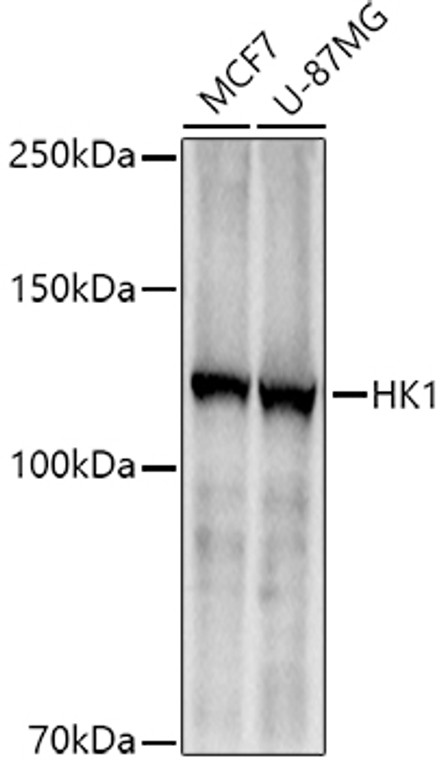| Host: |
Rabbit |
| Applications: |
WB/IF |
| Reactivity: |
Human/Mouse/Rat |
| Note: |
STRICTLY FOR FURTHER SCIENTIFIC RESEARCH USE ONLY (RUO). MUST NOT TO BE USED IN DIAGNOSTIC OR THERAPEUTIC APPLICATIONS. |
| Short Description: |
Rabbit monoclonal antibody anti-HK1 (21-219) is suitable for use in Western Blot and Immunofluorescence research applications. |
| Clonality: |
Monoclonal |
| Clone ID: |
S4MR |
| Conjugation: |
Unconjugated |
| Isotype: |
IgG |
| Formulation: |
PBS with 0.02% Sodium Azide, 50% Glycerol, pH7.3. |
| Purification: |
Affinity purification |
| Dilution Range: |
WB 1:500-1:2000IF/ICC 1:50-1:200 |
| Storage Instruction: |
Store at-20°C for up to 1 year from the date of receipt, and avoid repeat freeze-thaw cycles. |
| Gene Symbol: |
HK1 |
| Gene ID: |
3098 |
| Uniprot ID: |
HXK1_HUMAN |
| Immunogen Region: |
21-219 |
| Immunogen: |
Recombinant fusion protein containing a sequence corresponding to amino acids 21-219 of human HK1 (NP_000179.2). |
| Immunogen Sequence: |
KIDKYLYAMRLSDETLIDIM TRFRKEMKNGLSRDFNPTAT VKMLPTFVRSIPDGSEKGDF IALDLGGSSFRILRVQVNHE KNQNVHMESEVYDTPENIVH GSGSQLFDHVAECLGDFMEK RKIKDKKLPVGFTFSFPCQQ SKIDEAILITWTKRFKASGV EGADVVKLLNKAIKKRGDYD ANIVAVVNDTVGTMMTCGY |
| Tissue Specificity | Isoform 2: Erythrocyte specific (Ref.6). Isoform 3: Testis-specific. Isoform 4: Testis-specific. |
| Function | Catalyzes the phosphorylation of various hexoses, such as D-glucose, D-glucosamine, D-fructose, D-mannose and 2-deoxy-D-glucose, to hexose 6-phosphate (D-glucose 6-phosphate, D-glucosamine 6-phosphate, D-fructose 6-phosphate, D-mannose 6-phosphate and 2-deoxy-D-glucose 6-phosphate, respectively). Does not phosphorylate N-acetyl-D-glucosamine. Mediates the initial step of glycolysis by catalyzing phosphorylation of D-glucose to D-glucose 6-phosphate. Involved in innate immunity and inflammation by acting as a pattern recognition receptor for bacterial peptidoglycan. When released in the cytosol, N-acetyl-D-glucosamine component of bacterial peptidoglycan inhibits the hexokinase activity of HK1 and causes its dissociation from mitochondrial outer membrane, thereby activating the NLRP3 inflammasome. |
| Protein Name | Hexokinase-1Brain Form HexokinaseHexokinase Type IHk IHexokinase-A |
| Database Links | Reactome: R-HSA-5619056Reactome: R-HSA-70171 |
| Cellular Localisation | Mitochondrion Outer MembranePeripheral Membrane ProteinCytoplasmCytosolThe Mitochondrial-Binding Peptide (Mbp) Region Promotes Association With The Mitochondrial Outer Membrane (Probable)Dissociates From The Mitochondrial Outer Membrane Following Inhibition By N-Acetyl-D-GlucosamineLeading To Relocation To The Cytosol |
| Alternative Antibody Names | Anti-Hexokinase-1 antibodyAnti-Brain Form Hexokinase antibodyAnti-Hexokinase Type I antibodyAnti-Hk I antibodyAnti-Hexokinase-A antibodyAnti-HK1 antibody |
Information sourced from Uniprot.org
12 months for antibodies. 6 months for ELISA Kits. Please see website T&Cs for further guidance










